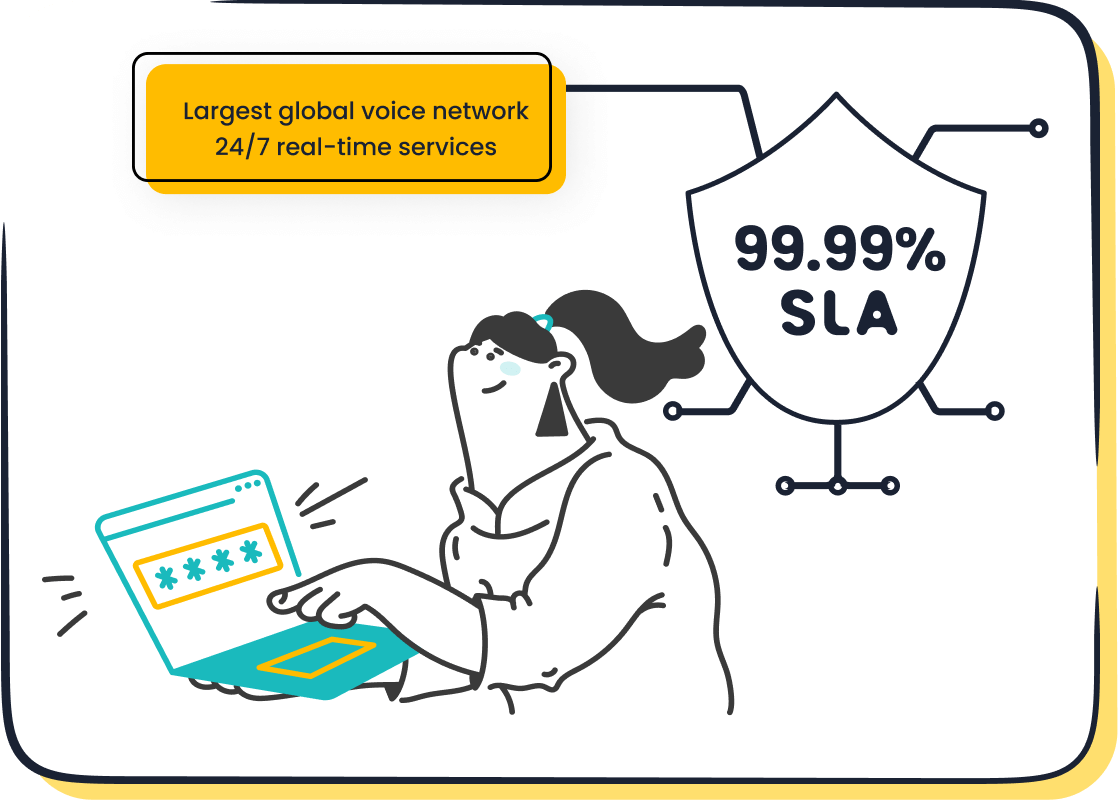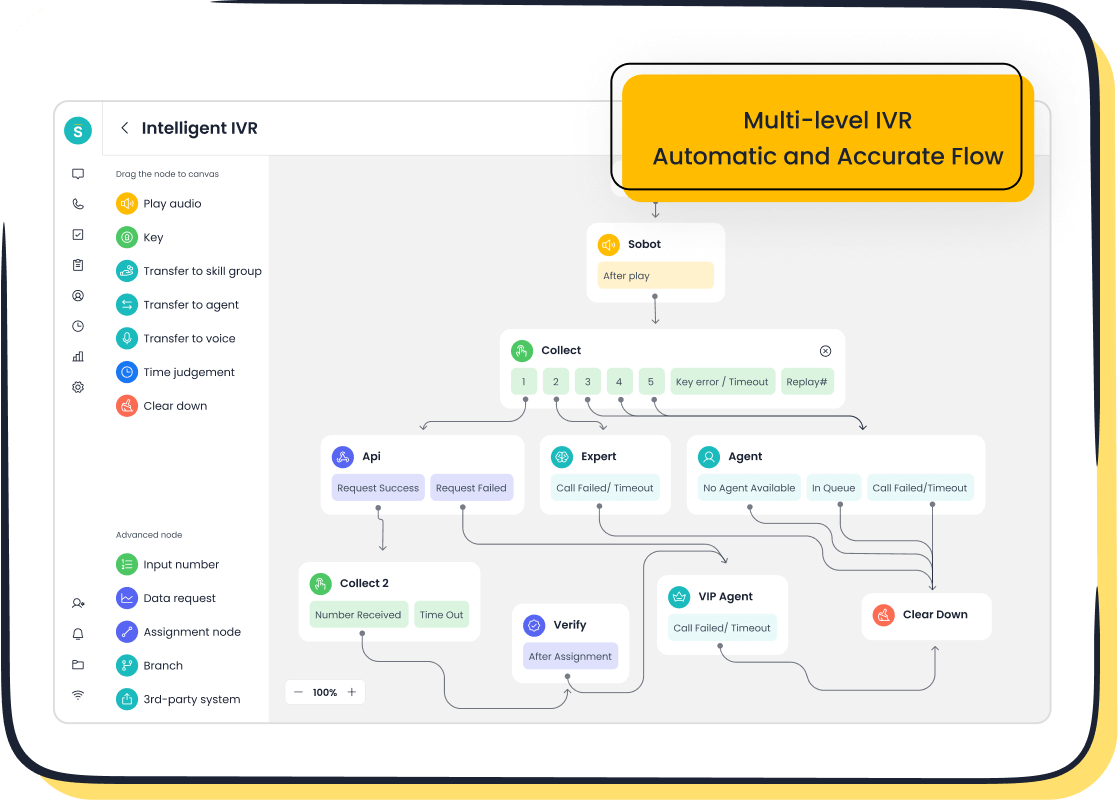Hosted vs Cloud-Based Inbound Call Center Platforms Comparison

You will likely find that a cloud-based call center suits most businesses better than a hosted inbound call center platform. Cloud-based call center software gives you rapid deployment, instant scalability, and lower operational costs while boosting customer experience and customer support. Hosted call center software lets you control customization, but it often costs more and requires complex maintenance. You should focus on improving customer interactions, security, reliability, and flexibility. Sobot AI and Sobot call center help you unify contact channels and streamline inbound call center software for better contact management.
Comparison Overview

Key Factors
When you compare hosted and cloud-based call center software, you need to look at several essential features. These include cost, scalability, reliability, security, integration, and flexibility. The table below gives you a clear view of how each inbound call center platform performs on these factors.
| Factor | Hosted Call Center Software | Cloud-Based Call Center (CCaaS) |
|---|---|---|
| Cost | High upfront and maintenance costs | Subscription pricing, pay-as-you-go |
| Scalability | Limited, hardware upgrades needed | Instantly scalable, no hardware limits |
| Reliability | Depends on local infrastructure | 99.99% uptime, global network |
| Security | On-premises control, manual updates | Enhanced security, automatic updates |
| Integration | Complex, often custom development | Easy CRM and system integration |
| Flexibility | Fixed, hard to adapt quickly | High flexibility, remote agent support |
You see that cloud-based call center solutions offer more cost-effective solutions. You pay only for what you use, and you avoid large upfront investments. Cloud contact center platforms also give you instant scalability. You can add or remove agents as your business grows. Hosted call center software often requires you to buy new hardware and pay for upgrades.
Cloud-based call center software also stands out for reliability. Many providers, like Sobot, guarantee 99.99% uptime. You get global reach and can support agents in any location. Security is another key factor. Cloud contact center solutions provide enhanced security with automatic updates and encrypted data transfer. Integration is simple, letting you connect your call center software with CRM systems and other tools. Flexibility is high, so you can support remote agents and adjust routing rules as needed.
Sobot Voice/Call Center Highlights

Sobot Voice/Call Center gives you a powerful cloud-based call center solution. You benefit from 99.99% uptime and a global network with 110 points of presence in 93 cities. Sobot supports global telephony contacts and offers seamless integration with CRM and other systems. You can manage agents, routing, and analytics from a unified workspace. Sobot's platform includes essential features like intelligent IVR, AI-powered voicebot, and real-time analytics. You can track agent performance, monitor call quality, and adjust routing rules instantly. Sobot's pricing model is transparent and cost-effective, making it easy for you to scale your operations. With Sobot, you get enhanced security, flexible deployment, and advanced analytics to improve customer experience.
Hosted Platform Pros & Cons

Hosted Platform Pros
You may consider a hosted inbound call center platform if you want more control over your call center software. Hosted platforms give you direct access to hardware and infrastructure. You can customize your system to fit your business needs. Many companies choose hosted call center solutions because they want to keep sensitive data on-site.
Here are some advantages you get with hosted call center software:
- Customization: You can tailor the system to match your workflow. You can set up essential features that fit your business model. You can create unique call routing rules for each agent.
- Data Control: You keep your data on your own servers. You decide how to store and protect customer information. This helps you meet strict compliance requirements.
- Performance: You can optimize hardware for your agents. You can upgrade equipment to boost productivity. You can monitor system performance and make changes quickly.
- Integration: You can connect your call center software with legacy systems. You can build custom integrations for your agents. You can add new essential features as your business grows.
- Security: You manage security protocols. You can set up firewalls and encryption. You can control access for each agent.
Tip: Hosted platforms work well for businesses with dedicated IT teams. You can handle complex setups and maintain your own infrastructure.
Hosted Platform Cons
You should also know the challenges of using a hosted inbound call center platform. These disadvantages can affect your agents and your overall productivity.
- High Costs: You pay large upfront fees for hardware and installation. You pay ongoing maintenance costs. You may need to buy new equipment as your team grows. Pricing can be unpredictable if you need frequent upgrades.
- Limited Scalability: You cannot add agents instantly. You must buy more hardware and set up new workstations. This slows down your response to business changes.
- Complex Maintenance: You must manage updates and repairs. You need IT staff to fix issues. Your agents may face downtime during maintenance.
- Remote Work Challenges: You cannot support agents working from home easily. You need secure connections and extra equipment. This limits flexibility for your team.
- Integration Difficulties: You may struggle to connect new call center solutions with old systems. Custom development takes time and money. Your agents may need to switch between multiple tools.
- Reliability Risks: Your system depends on local infrastructure. Power outages or hardware failures can disrupt service. Your agents may lose access to essential features during downtime.
- Slow Deployment: You cannot launch new call center software quickly. You must plan installations and train agents. This delays your ability to respond to market changes.
- Security Burden: You must keep security protocols up to date. You need to monitor threats and apply patches. Your agents rely on your IT team to keep data safe.
- Pricing Complexity: You face unpredictable costs for upgrades and repairs. You must budget for hardware, software, and IT support. Pricing changes as your needs change.
- Productivity Impact: Your agents may lose time during system updates. You may need to train agents on new essential features. This can lower productivity if you do not manage changes well.
Note: Hosted inbound call center software may suit businesses with strict compliance needs. You must weigh the cost-effectiveness against the flexibility and scalability of other call center solutions.
Cloud-Based Call Center Pros & Cons
Cloud-Based Pros
You gain many benefits when you choose a cloud-based call center for your inbound call center platform. Cloud-based call center software helps you scale your operations quickly. You add agents or features without buying expensive hardware. You pay only for what you use, which keeps costs predictable.
You improve customer experience with cloud contact center solutions. You support remote agents and offer omnichannel support. Your team handles calls, chats, emails, and social media from one workspace. You use advanced routing to connect customers to the right agent. This leads to faster resolution times and better customer interactions.
Sobot Cloud Call Center stands out as one of the best cloud contact center solutions. You get 99.99% uptime and global reach. Sobot supports over 10,000 brands and offers seamless integration with CRM systems. You use analytics to track agent performance and call quality. You adjust routing rules instantly to meet changing needs.
You boost productivity with CCaaS platforms. Your agents work from anywhere. You manage teams across different time zones. You use self-service options like AI-powered voicebots and chatbots. Customers solve simple problems on their own, which frees up agents for complex issues.
You also benefit from improved self-service options. Sobot Cloud Call Center lets you build intelligent IVR menus and automate common tasks. You use analytics to find trends and improve service. You offer secure, encrypted data transfer and automatic updates. Your team stays focused on customer support instead of IT maintenance.
Here are the main benefits of cloud-based call center solutions:
- Scalability: You add or remove users and features as needed. Sobot Cloud Call Center supports seamless scaling for seasonal spikes and long-term growth. You avoid large upfront investments.
- Remote Work: You support agents working from home or different locations. You use CCaaS technology to manage teams globally.
- Customer Experience: You offer omnichannel support and advanced routing. Customers reach the right agent quickly. You improve customer interactions and satisfaction.
- Cost Efficiency: You pay for what you use. Sobot uses subscription and pay-as-you-go pricing. You control costs and avoid surprise expenses.
- Reliability: You get 99.99% uptime and global network coverage. Sobot has 110 points of presence in 93 cities.
- Security: You benefit from encrypted data transfer and automatic updates. Your data stays safe.
- Integration: You connect your call center software with CRM and other business tools. Sobot makes integration simple.
- Self-Service: You use AI-powered voicebots and chatbots. Customers solve problems on their own. You reduce agent workload.
- Analytics: You track performance, call quality, and customer satisfaction. You use data to improve service and productivity.
Tip: Sobot Cloud Call Center gives you flexible scaling, competitive pricing, and robust features. You handle fluctuating call volumes and support global teams with ease. Learn more about Sobot’s capabilities at Sobot Voice/Call Center.
Cloud-Based Cons
You should also consider the drawbacks of cloud-based call center solutions. While CCaaS platforms offer many benefits, you may face some challenges.
You depend on internet connectivity for your cloud-based call center. If your connection drops, your agents lose access to call center software and customer support tools. You need a reliable network to avoid service interruptions.
You trust your cloud contact center provider to keep your data secure. Most providers use strong encryption and automatic updates, but you must review their security policies. You may need to meet industry compliance standards.
You may face integration challenges if you use legacy systems. Some older tools do not connect easily with cloud technologies. You may need technical support to set up integrations.
You rely on your provider for updates and maintenance. Most CCaaS platforms handle this well, but you lose some control over system changes. You must stay informed about new features and updates.
You may have concerns about data residency. Some businesses need to store data in specific countries. You should check if your cloud-based call center meets these requirements.
Here are some common drawbacks of cloud-based call center solutions:
- Internet Dependence: You need a stable internet connection. Outages can disrupt customer support and routing.
- Security and Compliance: You trust your provider for data protection. You must check compliance with industry standards.
- Integration Issues: You may need help connecting legacy systems to cloud-based platforms. Some integrations require technical support.
- Control Over Updates: You rely on your provider for software updates. You may not control the timing or features.
- Data Residency: You must verify where your data is stored. Some businesses have strict requirements.
Note: Most businesses find that the benefits of cloud-based call center software outweigh the drawbacks. You gain flexibility, scalability, and improved customer experience. Sobot Cloud Call Center addresses many common concerns with secure, reliable, and scalable CCaaS technology.
Choosing the Right Inbound Call Center Platform
Business Needs
You need to match your inbound call center platform to your business size and growth plans. Large enterprises often choose advanced on-premise or integrated cloud solutions. These platforms support global customer bases and offer scalability for future growth. Small and medium-sized businesses (SMEs) usually prefer hosted or cloud-based platforms. These options provide cost-effectiveness, easy deployment, and flexibility for expanding teams. The general market trend shows rapid growth in hosted and cloud-based segments. Companies want fast deployment, centralized contact management, and operational agility.
| Company Size / Growth Plans | Preferred Platform Type | Reasons / Benefits |
|---|---|---|
| Large Enterprises | Advanced on-premise or integrated cloud solutions | Support global customer bases, scalability, profitability, business continuity, AI integration |
| SMEs | Hosted/cloud-based platforms | Scalability, cost-effectiveness, ease of deployment, aligns with growth plans and resource constraints |
| General Market Trend | Hosted/cloud-based segment | Fastest growth due to rapid deployment, scalability, operational agility, centralized applications, secure collaboration, enhanced tracking |
You should consider your contact volume, future expansion, and available resources. If you expect rapid growth, cloud-based call center software and CCAAS platforms let you scale quickly. You avoid large upfront costs and get flexible contact management.
Compliance & Security
You must protect customer data and meet industry regulations. Hosted platforms give you direct control over data storage and security protocols. You manage compliance on your own servers. Cloud-based call center software offers enhanced security with automatic updates and encrypted data transfer. Many CCAAS providers help you meet global compliance standards. You should review your industry’s requirements before choosing a platform. Sobot’s cloud call center software provides secure contact handling and supports encrypted dialing for customer support.
Tip: Always check if your call center software meets local and international compliance standards. Enhanced security features help you build trust with your customers.
Integration & IT Resources
You need seamless integration between your call center software and CRM systems. This centralizes contact operations and creates a unified source of customer data. Integration improves customer support by enabling personalized communication and efficient contact management. Essential integration capabilities include:
- Connecting inbound call center software with CRM for unified contact data.
- Enabling callback options and queue position announcements for better customer experience.
- Supporting global telephony contacts for international customer support.
Sobot’s CCAAS platform makes integration simple. You can connect with popular CRM systems and manage contacts from one workspace. You do not need a large IT team to deploy or maintain cloud-based call center software. Sobot supports global telephony contacts, so you can reach customers anywhere.
Note: Choose a platform that matches your IT resources. Cloud-based CCAAS solutions reduce the need for complex maintenance and let you focus on customer support and contact management.
Use Cases & Recommendations
Hosted Platform Scenarios
You may choose a hosted call center software platform if you need full control over your contact systems. Hosted solutions work well for companies with strict data rules or unique workflows. If your business has an in-house IT team, you can manage updates and security on your own. You might prefer hosted platforms when you want to keep all customer interactions and contact data on local servers. Some industries, like government or healthcare, often need this level of control. Hosted platforms also help when you have custom routing needs that standard cloud systems cannot support. You can build special routing paths for each agent or department. This setup gives you the power to shape every part of your contact process.
Note: Hosted platforms suit businesses with stable contact volumes and little need for remote agent work. You get strong data control but may face higher costs and slower scaling.
Cloud-Based Platform Scenarios
Cloud-based call center software fits companies that want flexibility and fast growth. You can add agents quickly and support remote work with ease. Many industries use cloud platforms to handle high contact volumes and changing needs. These include:
- Automotive
- Financial Services
- Healthcare
- Home Services
- Insurance
- Retail
- Telecom
- Travel & Hospitality
You benefit from instant routing changes and easy integration with other tools. Cloud platforms let you manage contact operations from anywhere. You can use self-service features like AI-powered voicebots to help customers solve problems without waiting for an agent. This boosts customer experience and keeps your team focused on complex contact issues. You also get strong analytics to track agent performance and improve routing. Cloud-based solutions help you deliver fast, reliable customer interactions across all channels.
Sobot Customer Experience Example
Weee!, America’s largest online Asian supermarket, improved its contact center by using Sobot Voice/Call Center. Before Sobot, Weee! struggled with rigid IVR systems and language barriers. After switching, Weee! set up flexible routing and multilingual support. Agents now handle contact from many channels in one workspace. Sobot’s system lets Weee! use self-service menus and smart routing to connect each customer to the right agent. This change led to a 20% rise in agent efficiency and a 50% drop in resolution time. Customer satisfaction reached 96%. Weee! now manages contact across time zones and languages, giving every customer a better experience. You can read more about Weee!’s journey here.
Tip: Sobot’s cloud-based call center software helps you unify contact, improve routing, and boost customer experience with advanced self-service and analytics.
You see that cloud-based inbound call center platforms work best for most businesses.
- You save money by reducing hardware and maintenance costs.
- You support customers 24/7 across time zones, which builds loyalty.
- You scale your service easily and handle more calls without losing quality.
- You enable agents to work from anywhere and boost productivity with automation.
- You use real-time analytics to improve performance.
If you want better customer experience, scalability, and cost efficiency, cloud-based solutions like Sobot Voice/Call Center help you reach your goals. Consider your business needs and explore Sobot’s platform for a smarter inbound call center solution.
FAQ
What is an inbound call center platform?
An inbound call center platform helps you manage incoming customer calls. You use it to route calls, track interactions, and support customers. Cloud-based call center software makes this process easier and more flexible.
How does a cloud-based call center improve customer experience?
You get faster response times and better routing. Cloud-based inbound call center platforms let you support customers across channels. You use features like AI-powered voicebots and analytics to solve problems quickly.
Can you integrate Sobot Cloud Call Center with your CRM?
Yes, you can connect Sobot Cloud Call Center with your CRM system. You manage customer data in one workspace. Integration helps you personalize support and improve contact management.
Is cloud-based call center software secure?
You benefit from encrypted data transfer and automatic updates. Providers like Sobot use strong security protocols. You protect customer information and meet compliance standards.
How do you scale your inbound call center platform with Sobot?
You add or remove agents easily. Sobot Cloud Call Center supports instant scaling. You handle more calls during busy times and reduce costs when call volume drops.
